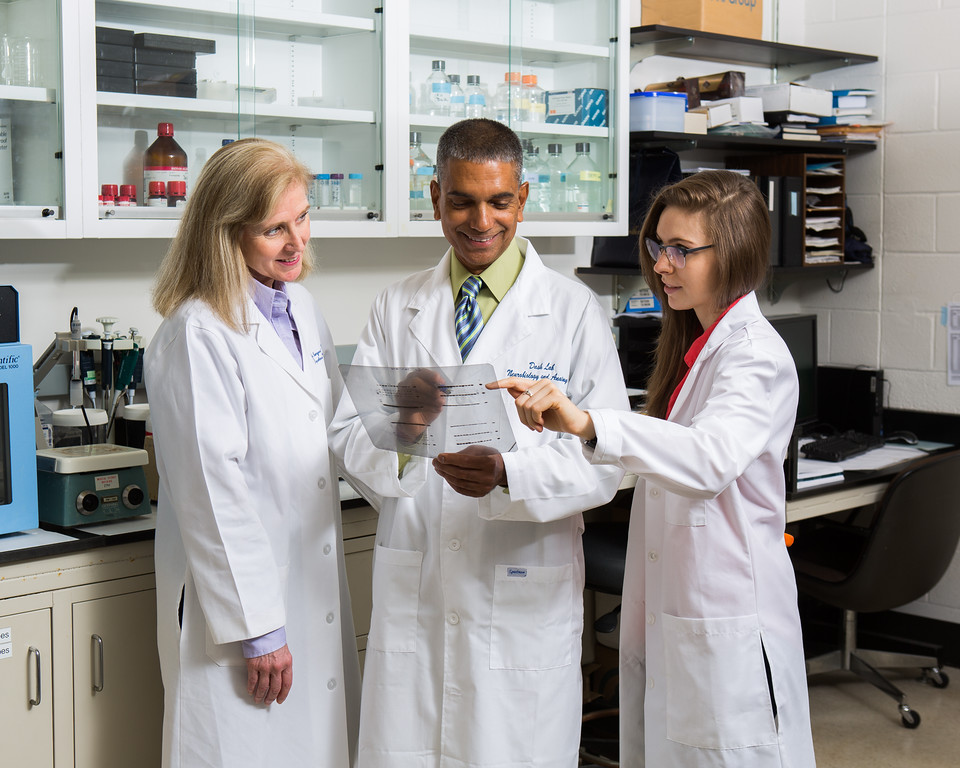Neuroscience Research Repository (NRR)
 The Neuroscience Research Repository (NRR) is a collaborative project of the Vivian L. Smith Center for Neurologic Research at the McGovern Medical School at UTHealth Houston. The NRR was approved by the Committee for the Protection of Human Subjects (CPHS) in 2008, and the first patient was enrolled in February 2009.
The Neuroscience Research Repository (NRR) is a collaborative project of the Vivian L. Smith Center for Neurologic Research at the McGovern Medical School at UTHealth Houston. The NRR was approved by the Committee for the Protection of Human Subjects (CPHS) in 2008, and the first patient was enrolled in February 2009.
The NRR is a prospective database of all neurosurgery department patients coupled with a tissue repository. The NRR integrates reliable clinical data with biologic information from patient tissue specimens in order to expand neuroscience research and translate laboratory advances into improved patient care. By collecting these standardized data and samples in a uniform manner for clinical, genomic, and proteomic analysis, their value is optimized in order to promote maximum research utility. The NRR has progressed into a unique and immense resource for studies involving brain and spinal cord injuries.
The NRR’s generalized datasets specific to broad neurological injury/disease conditions include: traumatic brain injury (TBI), spinal cord injury (SCI), Vascular, Tumor, Epilepsy, Genetic, and General Neuroscience studies. Data generated as part of clinical care is captured, de-identified, and analyzed for research purposes. Clinical data is collected through a neuro-specific electronic medical record system called Neurocore. The NRR and Neurocore provide valuable resources supporting our physicians and scientists in their research. Before samples or data are analyzed, protocols are reviewed and approved by CPHS and the Neuroscience Research Review Committee. All of our patients are welcome to participate in the NRR. Patient outcomes, responses to, and complications from treatment, compliance with standard care protocols and quality assurance data are captured with the ultimate goal of improving neurosurgical care through evidence-based medicine. For example, by utilizing NRR data and that from the University Health Consortium (UHC), potential areas of opportunity for improvement in care delivery may be identified and successfully addressed.
One of the most recent research successes facilitated by the NRR was a novel investigation into the genetic factors that contribute to the development of intracranial aneurysms. By using the NRR to collect samples and detailed genetic data on intracranial aneurysm patients and their families, Dr. Dong Kim and Teresa Santiago-Sim, Ph.D. identified a gene mutation present in a subset of patients who develop intracranial aneurysms. The gene mutation was then evaluated in animal models to confirm its contribution to the disease process. This finding is clinically useful in that it will prompt the close monitoring of patients with the mutation and a family history of aneurysm. Furthermore, future study of this gene is expected to uncover underlying genetic mechanisms.
The Vivian L. Smith Foundation has generously provided support for this research platform.
PROCESS FOR OBTAINING SAMPLES
1) The investigator must be an NRR Investigator who is associated with the UTHealth Vivian L. Smith Department of Neurosurgery.
2) The protocol for sample use must be approved by:
a) the Committee for the Protection of Human Subjects at The University of Texas Health Science Center at Houston, and
b) the NRR Review Committee. (All samples or data released are de-identified and the investigator will not know identifiers.)
3) The investigator must complete the investigator Recipient Usage Agreement (available from the department).
4) Requests for samples should be made on the Sample Request Form (available from the department).